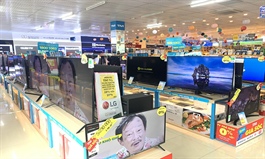The dilemma of Vietnamese smartphone brands
The dilemma of Vietnamese smartphone brands
The dependence on outsourced components and fierce competitions in the low-priced segment are the obstacles that hinder Vietnam’s smartphone manufacturers.
The Vsmart Aris Pro, the smartphone of VinSmart with an under-display camera. Photo by VnExpress/Tuan Hung.
|
The latest market exit of a Vietnamese smartphone brand is VinSmart, the smartphone manufacturing unit of Vietnam’s biggest private conglomerate Vingroup.
The company announced in a statement earlier this month that it will stop manufacturing smartphones as "the production no longer brings breakthroughs and creates unique values for users."
VinSmart was the fourth largest smartphone brand in Vietnam by market share in Q1.
Prior to the exit of VinSmart, various Vietnamese mobile brands have vanished from the market, including Q-mobile and Mobiistar.
A reason for the struggle of local mobile brands is that the Vietnamese manufacturers depend on imported phone components or even outsourcing the whole products, according to industry insiders.
Back in 2010, Vietnamese smartphone brands mostly chose Original Design Manufacturing (ODM) as their business model, which means they select an already-existing product design from factories in other countries (mostly China), and sell it under their own brand name.
The advantage of ODM is that it helps companies to reduce costs, but at the same time, the companies do not own the technology, thus can not become the market leader.
Mai Trieu Nguyen, owner of smartphone retail chain Mai Nguyen, said that ODM is now inappropriate as "when a company has to rely entirely on another manufacturer, it will not survive on the market."
"Smartphones that want to be sold well need to be different and creative. Therefore, smartphone brands that do not own the technology will fail," an expert working for a local smartphone brand said.
In VinSmart’s case, the company has its own factory, its research and development team with several notable technology achievements including under-display camera and quantum security chip. However, it still depends on imported phone components.
The global component market is being heavily hit by the pandemic, resulting in the global chip crisis. Components such as processing chips, display screen prices surge, while shipping time increases up to several months. Large phone manufacturers will buy out the phone components, with little units left for minor manufacturers to acquire.
Another reason for the struggle of local phone brands is the fierce competition from the foreign opponents in the low-priced segment, which is the segment that most Vietnamese smartphone brands target.
Low-priced segment is the market segment with smartphones priced under VND4 million ($174).
According to data of two large smartphone retailers, Mobile World and FPT Shop, no VinSmart products are in the top seller lists in Q1. In a smaller retail chain, Hoang Ha Mobile, VinSmart phones that generated the most revenues in Q1 are the Vsmart Joy 4 and Vsmart Live 4, whose prices ranged from VND2.5-3.5 million. Meanwhile, only a few VinSmart products priced over VND5 million are sold.
Bphone, the smartphones developed by Vietnam’s cybersecurity firm BKAV, are priced over VND7 million and have never appeared in smartphone retail stores. Its sales are also undisclosed.
"The low-priced segment is dominated by Chinese brands, with large-scale production advantages and low prices, which the local brands are unable to compete with," the spokesperson of FPT Shop said.
Nguyen added that Vietnamese smartphones have to compete with the Korean smartphone giant Samsung with it’s A Series and M Series smartphones in the low-priced segment. At the same time, Chinese smartphone brands have been continuously releasing new models and lowering their prices in exchange for larger market share.
"Despite owning a decent market share, with 10 percent in Q1, VinSmart can hardly make profit from smartphone production as it has to invest heavily in factories and pay high salary for human resources," he said.
Tran Viet Hai, CEO of Bkav Electronics, the company that produces Bphone, said that price competition on the smartphone market is a "cash burning game" for producers, which leads to losses.
"When a smartphone brand only targets the low-priced segment, a minor increase in its selling price can lead to uncertainties among its customers. Therefore, solely targeting the low-priced segment is not a sustainable business strategy," he said.
Without VinSmart, some local mobile phone brands remaining are Bphone, VNPT Lotus of state-owned telecom firm VNPT, and Masstel of Vietnam’s smartphone producer Masscom Vietnam Corporation. Bphone now only has two smartphone models, Bphone B86 and Bphone B86s, while VNPT Lotus has virtually disappeared from the market and has not released any new phone model for many years.
Masstel mostly produces phones that are thick in size and designed for the elderly, with the best selling model being the mobile phone priced at VND200,000.
Industry insiders said that there will hardly be another local smartphone brand that can replace VinSmart in the competition with the foreign brands.
BKAV spokesperson said that the company will continue to develop smartphone technology.
"Vietnam's electronics industry is developing, and it certainly needs a leading local mobile phone brand," Hai said.
























